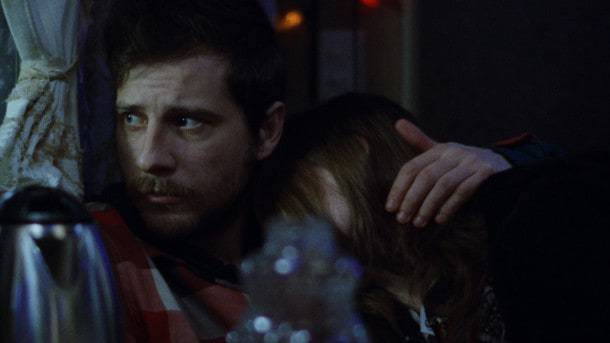
Perhaps the most polarizing film at this year’s Sundance Film Festival, writer-director Matt Sobel’s Take Me To The River has left some critics grossed out and others fascinated with this evocative, probing mood piece that winds up a bit thin. It’s certainly eerie and creepy, but it’s well worth a watch for its excavation of family secrets, its exploration of child and adolescent sexuality, and the eerie mind games that can happen between family members too afraid to talk about what’s actually going on.
The film finds Ryder (Logan Miller, The Stanford Prison Experiment), an openly gay Californian seventeen-year-old, at a family reunion in Nebraska, where he’s been instructed by his mother (Robin Weigert) to not to come out to the extended family. They’re clearly a WASPish clan, and Ryder’s half-Jewish origins from his father (Richard Schiff) already make him something of an uncomfortable outsider. Wearing a low-cut v-neck shirt, short red shorts, and hipster sunglasses, he gives off an exotic aura that attracts his young cousins, especially the young girls. Before long, the 10-ish-year-old Molly (Urusla Parker) is insisting he hang out with her, joining her in the barn to look at a bird’s nest.
Since Ryder wants to be amiable and a good sport, he offers to take care of her, giving his uncle Keith (Josh Hamilton) a break from the job. But he soon finds Molly to be a trouble-maker, expressly ignoring her father’s instructions, taunting Ryder, and making him feel uncomfortable: he wants to be the fun cousin, but he’s also supposed to be the responsible one. After she gets up on his shoulders to reach up high, Sobel cuts to an exterior, which finds Molly running screaming from the barn toward the family picnic, with blood between her legs. What happened in the barn? Is Molly just seeking attention? Does her screaming have anything to do with Ryder? These are the central questions that will guide — we think, at first, at least — what unfolds in the film.
It takes very little time for Keith and his wife (Azura Skye) to make accusations, ones which Ryder feels could be cleared up if his mother would just let him tell the truth about his sexuality. This cover-up spawns a series of mind games, the point of which is the mystery of the film: Ryder finds himself caught in the middle. He gets banished from his grandmother’s house for the evening, and wakes up to find the words “California pervert” painted on his parents’ car — all very upsetting, especially the way in which his mother tries to stay with him and comfort him, but only to a point. She’ll leave abruptly without explanation, leaving Ryder to clean up a mess, confused and shaken. She’s hiding something, and she has a reputation to uphold.
Sobel zags when you expect him to zig: instead of this being a film about homophobic persecution, it goes somewhere much creepier and bizarre. Keith decides to make nice with Ryder, but in doing so, makes himself an even more menacing presence. When showing Ryder how to shoot a gun, we expect something bad to happen. The stillness of the camera, the quiet around them, and the complacency of Keith and his family at the dinner table with Ryder the following night, after the fit they threw, make everything all the more eerie.
Keith keeps throwing Ryder and Molly together in uncomfortable ways. He invites them to play together in Molly’s room alone — and then closes the door. It’s like he’s encouraging Ryder to do something wrong or to put himself in a compromising situation. It’s only when Molly takes Ryder to the river that we start to learn what’s going on behind everything, which appears to have its roots in an uncomfortable game of “chicken fighting.”
The trouble with the film is it’s all creepy mood, all exploration of the discomforts of girl sexuality, without actually going anywhere with it. It gets lost in the third act. Secrets get revealed, but has Ryder really changed or grown? Ryder is more there as a witness, an audience surrogate, than as an active participant. Is Molly a victim or a girl with agency? It leaves both open to interpretation, which is fair, but it also makes her more of a cypher than a curious girl in a confusing world.
Both children seem to be pawns in a bigger game, one which is only about a secret getting outed than about the ramifications of it. Sobel is careful not to judge, and especially not to judge the children by the unreasonable rules of the adult world they find themselves in, but in so doing he also doesn’t really have a point. He illuminates blurry lines in a fascinating way, but what those lines mean, how they’ve been crossed, and where things go from there are beyond the scope of the film. It’s a shame, because it’s a film about exploration and curiosity that just never digs deep enough.
Read more: Review: Hong Khao’s Lilting explores grief >>

